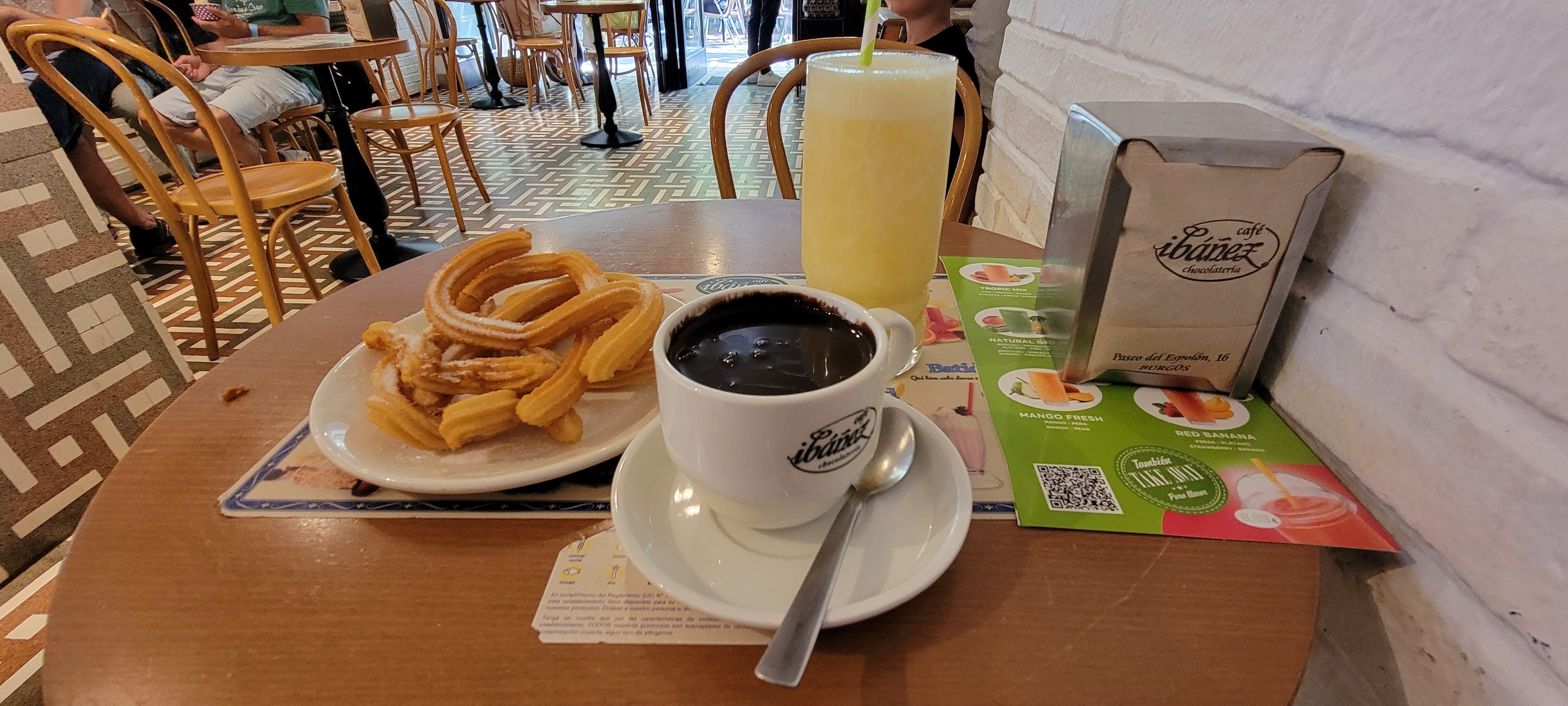My Wi-Fi Travel Log
09 October 2025 • by Bob • Travel, Humor
I was cleaning out some old Wi-Fi networks from my laptop settings, and an unexpected twist was that it contained a nostalgic record of several places that I've stayed during my travels throughout Europe (plus a quick stay in Hawaii).
Some of those travels were with my wife, and others were from a trip that my son and I took a few years ago along the former East/West border in Germany. Lots of good memories.

Chocolate Break on a Warm Spanish Evening
28 August 2025 • by Bob • Guitar, Humor, Travel
I was perusing my collection of photos from my misadventure along the Camino de Santiago in Northern Spain from two years ago, and I stumbled across this gem from my stop in Burgos.
Can anyone hazard a guess as to why I chose this specific cafe to sample the local chocolate-dipped churros?

The Glamour and Romance of Travel
28 January 2025 • by Bob • Travel, Humor
I believe I've stayed at this hotel on more than one occasion:
The Trials and Trappings of Wealth and Fashion
09 July 2024 • by Bob • Humor, Travel
Several years ago my wife and I were in Venice, Italy, when the 58th International Art Exhibition (which was aptly titled "May You Live In Interesting Times") was about to open. Many of the richest people from around the globe had descended on this tiny, northern Italian city via their expensive megayachts and private jets, and their respective attendances were somewhat assured because the world's wealthy simply MUST be seen at events like these, lest they be perceived as "uncultured" by their peers.
As my wife and I caught sight of myriad jet setting millionaires and billionaires who were strolling along the canals of Venice wearing the latest fashions from Milan, Paris, and London, I made the following observation: when you're poor and you're weird, you're viewed as crazy; but if you're rich and you're weird, you're viewed as eccentric. When applying this revelation to the crowds that had gathered in Venice, this meant that everyone who wasn't an eccentric elite witnessed a never ending parade of unusual apparel adorning the ranks of affluent art show attendees, which was like watching a comedy show in which each performer was trying to outdo the last for having the most outlandish costume.
As one prosperous pair passed us wearing clothes that a clown wouldn't wear to a circus, I leaned over to my wife and remarked, "Some people are so fashionable that they don't realize how stupid they look." My playful observation cannot be overstated; I saw several nouveau riche who looked utterly ridiculous, even though in some circles they might be considered fashionable. The super rich who were visiting Venice during our tenure there were living out a textbook manifestation of The Emperor's New Clothes; and like the gullible saps in the fairy tale, they didn't realize that the joke was on them. I didn't take any photos - because that would be rude - but if you've seen the films in the "The Hunger Games" series, just imagine the crowds from "The Capital" walking around in real life; that's pretty much what we saw.
PS - to their credit, the affluent couple in absurd garments that I mentioned earlier were walking an exquisitely groomed Afghan Hound through the streets of Venice. I would imagine that poor animal was probably embarrassed to be seen in public with its owners.
Reflections on Persistence, Pagans, and the Past
08 April 2024 • by Bob • History, Religion, Travel
A few years ago, my wife and I were fortunate enough to visit Rome, and among the thousands of photos that I took during our stay, this seemingly insignificant image of a nun walking through the remains of the Circus Maximus stands out for me.
Despite Hollywood's common depictions, the Romans did not typically sacrifice Christians in the Colosseum. On the contrary, the infamous martyrdoms of Christians were usually carried out in the Circus Maximus. With that in mind, when I saw a solitary nun crossing the empty field, I couldn't help but reflect on the irony of the scene. This stadium had once played host to the barbarous spectacle of martyring her predecessors, usually by beheading, or burning at the stake, or being fed to myriad wild animals. Yet on this day, many centuries later, there were nothing but ruins where the mighty empire of Rome once stood, and this nun could walk with impunity through the remnants of Rome's demise.
Anyway, these are the kinds of things that run through my mind when I'm visiting areas of historical significance. (Perhaps there's something wrong with me.)
When in Rome
27 April 2023 • by Bob • Humor, Travel, Marriage
Let me tell you a funny story that I heard about the train station in Rome:
Once upon a time, there were two travelers in the Roma Termini who were on their way back from a long day in Pompeii, and they were changing from the cross-country trains to the metro. They had passed through that same station earlier that day, and one of the travelers noticed that the path they took through the station seemed unnecessarily long. However, he also noticed that there was another path they could take through the station, which seemed as though it would reduce their walking distance by hundreds of meters. When this first traveler suggested that they take a different route through the station, the second traveler said she didn't want to take the risk that an alternate path might take them too far out of their way. The first traveler said that he was 99% sure that his suggested route was shorter, but he couldn't guarantee his suggestion with 100% certainty, so the second traveler wouldn't yield.
Unbeknownst to the first traveler, the second traveler had an ulterior motive for her unwavering skepticism: they had been traveling all day in the hot sun, and she needed to use the little traveler's room, so she didn't want to waste a bunch of time wandering through a train station if the first traveler was mistaken. However, the second traveler didn't say that she needed to use the little traveler's room, so the second traveler seemed to the first traveler like she was being overly difficult for no discernible reason, while the first traveler probably seemed to the second traveler like he was being an insensitive schmuck.
With a not-so-subtle tone of exasperation, the second traveler told the first traveler something like, "You can do whatever you want, but I'm going to follow the route that we used earlier." The first traveler took the second traveler's statement as a challenge, so he left to pursue his shorter path through the station - which worked out exactly as he had expected - and because he was also more than a little exasperated with the second traveler, he boarded the metro without the second traveler.
The first traveler pouted all the way back to his hotel, where he arrived around a half hour before the second traveler. However, the reason why the second traveler arrived later wasn't because she needed to use the little traveler's room; she boarded a different metro car because she had the first traveler's metro pass, and she spent that half hour unsuccessfully searching the metro station in a desperate attempt to find the first traveler, which delayed her departure. However, unbeknownst to the second traveler, the first traveler had put aside his sulking long enough to buy a one-way ticket on the metro to get back to their hotel.
The moral of this little tale? Don't be so secretive when you need something, and don't act like an insensitive schmuck when your traveling companion doesn't agree with you.
Nothing in that story has anything to do with my wife's and my recent journey to Rome, of course. We always made it safely back to our hotel. Perhaps we arrived together. Perhaps we didn't. Perhaps one of us arrived a half-hour after the other, but that doesn't mean anything, does it?
![]()
Memories of Better Days Gone By
17 August 2021 • by Bob • Random Thoughts, Politics, Travel
Facebook just reminded me that two years ago - before the pandemic wreaked havoc across the globe and killed 4.5 million people, before the domestic rioting and burning of our cities, before the collective meltdown of all mainstream news outlets into the primary sources of worthless and biased drivel, before the woke apologists began their Orwellian campaign of rewriting history and manipulating the English language in order to foster division between the classes, and before the second humiliating defeat of our armed forces at the hands of career politicians who have no idea how to fight/win a war - I was standing on a mountain in the Alps, looking across the glaciers and valleys at the Matterhorn. There are some days when I need to be reminded that there is beauty in this world that is worth seeing, and activities that bring you joy that are worth doing.
My German Skills are a Little Rusty
03 March 2020 • by Bob • Travel, Military
I attended a reunion this past August in Fulda, Germany, with some of the folks from the 511th MI Company. As we were leaving a restaurant after dinner one night, we bumped into a traveling Bachelor Party that was making its way through streets of the city. They were already a few sheets to the wind, which undoubtedly explains why they appeared to think that I was a hilarious attraction. (I have that effect on drunk people, so it seems.)
Anyway, they were sounding off with a series of German idioms, and after each one they would laugh uproariously and ask me to join in. This didn't seem possible to me, as I hadn't lived in Deutschland for 30 years, and even then I had been a Russian linguist.
However, as luck would have it - somewhere in the back of my aging mind was the sole German idiom that I had managed to retain for all these years, which I recited to the assembled crowd:
"Freier macht die augen auf, heiraten ist kein pferdekauf!"
This had the desired effect - they laughed even harder than before, shook my hand, offered me a beer, slapped me on the back, etc. After offering me some pomme frites, (which were stored in the groom's hat - ugh), they bid me "Auf Wiedersehen," and they wandered off to continue their evening's festivities.
Unfortunately, that idiom loses a little in translation, (especially when using Google or Bing translate), but trust me - it's pretty funny for a soon-to-be-groom to hear. What it says, in essence, is: "Open your eyes, free man - getting married is not like buying a horse."
Nevertheless, it's nice to know that occasionally your long lost language skills can still come in handy.
![]()
English isn't English
28 February 2020 • by Bob • Humor, Travel
A colleague recently reminded me of George Bernard Shaw's famous quote that "England and America are two countries separated by a common language." I have lived through many situations where I have experienced that sentiment firsthand. And with that in mind, I'd like to share a story about a conversation that I had when I was working with the British RAF:
RAF: "You troffing today?"
ME: O_o
RAF: "Yamming?"
ME: O_o
RAF: "Nose-bagging?"
ME: O_o
RAF: "Scoffing?"
ME: O_o
RAF: "Bucking & gagging?"
ME: O_o
RAF: "Are you eating lunch?"
ME: "Yes."
Paying Tribute to Freddie
25 November 2019 • by Bob • Music, Travel
Today marks the 28th anniversary of Freddie Mercury's untimely death in 1991 at the age of 45. I have been a fan of Freddie and Queen since the early 1970s, and to this day I wonder how much more Freddie would have accomplished had his excessive lifestyle not taken its toll. That being said, shortly before my wife and I visited Montreux, Switzerland, this past August, I learned that the city had placed a statute of Freddie Mercury along the shore of Lake Geneva as a memorial to the years that he had lived there. As it turns out, the hotel that we had already reserved was within perhaps a half-kilometer from the sculpture.
My wife and I arrived in Montreux in the early evening, and before dinner we walked along the boardwalk next to Lake Geneva, with the hopes that we would be able to find the memorial before it grew too dark. We found Freddie's statue just as the sun began to set, and my wife took the following two photos: the first image was of the sun setting beside Freddie, and the second was of me behaving like the tourist I was by imitating Freddie's famous pose in the quickly fading twilight.
Obviously my jacket was nowhere near as elaborate as Freddie's original, and my 360 camera on a monopod had to substitute for Freddie's microphone stand. Nevertheless, before his death, Freddie had said, "You can do what you want with my music, but don't make me boring." With that in mind, I would like to think that Freddie would be greatly amused by the number of tourists who fondly remember him as anything but boring.





